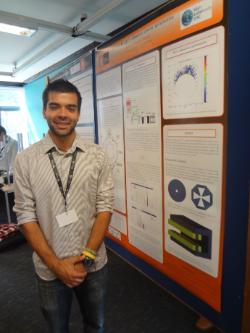Interview with Héctor García Morales
 Hector Garcia Morales was born in Barcelona, Spain, in 1987. He studied physics at the University of Barcelona and after completing his degree, he started his master studies in particle accelerators at the same university. His master thesis was carried out in collaboration with CERN and focused on the optics design of an emittance measurement station at the RTML line for CLIC. After presenting his master’s thesis, he participated in the Joint Universities Accelerator School before getting a position at CERN as a PhD student.
Hector Garcia Morales was born in Barcelona, Spain, in 1987. He studied physics at the University of Barcelona and after completing his degree, he started his master studies in particle accelerators at the same university. His master thesis was carried out in collaboration with CERN and focused on the optics design of an emittance measurement station at the RTML line for CLIC. After presenting his master’s thesis, he participated in the Joint Universities Accelerator School before getting a position at CERN as a PhD student.
In recent years Héctor has been focused on the study and optimization of the final focus system for future linear and circular colliders, especially on CLIC and ILC. During his PhD, he attended the Linear Collider School 2011 in Monterey, California.
In 2014 Héctor joined the oPAC network at Royal Holloway University of London, where he continued his work in the LHC collimation systems.
What did attract you to the oPAC network? Has it fulfill your expectations?
The oPAC network is within the Marie Curie Research program which is very prestigious and this makes it attractive. Being part of an accelerator network also offers you the possibility to learn about other topics you are not directly working on. The amount and variety of activities carried out is probably one of the points that make the difference.
Why did you choose to go to Royal Holloway?
I love London and a love it even more after oPAC. I already knew part of the crew of Royal Holloway and that made the decision easier. But the key point was that the research crew is quite young and active.
Can you explain in a few words what your project was about and what have you achieved?
My project was about the optimization of the collimation system of the LHC towards its upgrade in 2025 HL-LHC. The collimation system removes particles with amplitude or energy deviations that become dangerous for the superconducting magnets that eventually might quench. In the future upgrade, the beam will carry almost twice the energy of the nominal LHC and the collimation system must be reoptimized.
What has oPAC provided you professionally?
First of all I learned a lot about how circular accelerators work since previously I was focused on linear colliders. But besides that, I think I got very useful research skills not directly related to my research thanks to the the training sessions provided by the oPAC network.
What are your professional plans now that oPAC has finished?
I got an new contract at Royal Holloway to keep working on the LHC collimation group at CERN. My plan is to stay in research for a few years at least and after that, nobody knows.
What will be your most cherished memory from oPAC?
There are so many that it is difficult to just take one of them. Eating ham in the narrow streets of Seville, jumping over the trees in Liverpool, dancing on a dark and smoky tavern in Darmstadt, the “who are we?” oPAC haka, Ricardo's British jokes... But probably the nicest is to have met a lot of different people from around the globe.
And the one you’d rather forget?
There are no bad moments to forget. Probably I would like to forget as soon as possible this interview ;-)